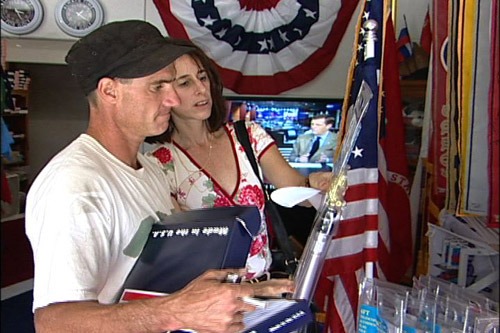
Serious Humor
Written by Margaret Tranggono | Posted by: Anonymous
We can only hope for more role models like Lisa Seidenberg in the film industry. With a few notable short documentaries already under her belt ("Being Human," "Mongolia on the Edge of Time," "Children of the Dust") Seidenberg not only gives a fresher, innovative, and often times humorous depiction of our society, but also a political and cultural message to match. Her latest documentary "Being Human" (2002) was accepted with much acclaim in several film festivals including the New England Film and Video Festival, San Francisco International Lesbian and Gay Film Festival, Global Visions Film Festival, and Berkeley Video and Film Festival.
A Connecticut native, Seidenberg is an award-winning videographer and documentary filmmaker with 20 years of experience shooting in international news and promotional, legal, and educational programs. She has worked for ABC News, CNN, Reuters, among others in Southeast Asia, Russia, the Middle East, Mongolia, China, and Haiti.
Seidenberg’s feature documentary "Pledge of Allegiance Blues" is currently in post-production, and she hopes to begin screening at film festivals and other venues by late spring.
MT: What inspired you to do "Pledge of Allegiance Blues"?
Seidenberg: "Pledge of Allegiance Blues" follows the lawsuit that would remove the words "under God" from the Pledge of Allegiance and the controversy that arose over it. I met the plaintiff, Mike Newdow, quite by chance when he visited Connecticut where I live. I was interested to meet him since he had been portrayed as such a despicable character by the mainstream media, and found him, to the contrary, to be quite engaging and complex in person and thought he would make a good film character. At the time, however, I had no idea the case would go all the way to the Supreme Court.
MT: What is the basic premise of the story?
Seidenberg: The film uses The Pledge of Allegiance as a starting point to examine ideas of religiosity and patriotism in America, including the Ten Commandments issue in Alabama and other stories involving church and state. I interviewed a lot of people, including Larry Flynt and Alan Dershowitz.
MT: You were quoted to have said that this is a "Bowling for Columbine" on the religious right. Could you elaborate on that?
Seidenberg: Like "Columbine," it will have a kind of collage-style, rather than a straight narrative, there’s a lot of humor, and the filmmaker is a character in the film. Unlike Michael Moore, however, I don’t have facial hair. Moore did a great service to documentaries by proving that a serious subject can also be funny and entertaining.
MT: Do you fear that the audience may take such serious subjects too lightly though?
Seidenberg: Not at all. What’s wrong with making people laugh? It’s a more subversive way to get your point across and much more appealing to audiences. The first time I heard an audience laugh at one of my screenings, it was addictive and I knew they were getting it. With "Pledge of Allegiance Blues," I’m taking on religion and politics. I can’t imagine doing it without humor.
MT: Your previous documentary, "Being Human," was about public nudity, which seems like a big jump to "Pledge of Allegiance Blues." Is there a pattern to your decision-making process in terms of what issues you want to explore as a filmmaker?
Seidenberg: I am always interested in characters that are not afraid to step out of society and challenge it, and in that way, the two films are actually quite similar. My parents were activists and so I suppose I am predisposed to people who are involved in political and cultural change.
MT: You’ve been in independent media since the ‘70s. What prompted you to go into this industry in the first place? Was it by chance or by choice?
Seidenberg: Totally by choice. Portable video technology was one of the most important inventions since the printing press for the dissemination of independent ideas and I wanted to be part of it. The Internet is significant also, but it’s really just random information. Film/video is still a better way to tell a story or express an idea. Books are too, but as this is a visual age, film is infinitely more effective.
MT: What would you say are the best and worst parts of making your own films?
Seidenberg: The best part is that you can’t be fired. The worst is that you can’t quit. You have to believe in yourself and your project when no one else does.
MT: Lessons learned from this project?
Seidenberg: I would try to involve more people earlier. Film is collaborative and benefits from that.
MT: Who are your major influences as a filmmaker?
Seidenberg: Groucho Marx, Godard, Chantal Ackerman, and Chris Marker. I wish there were more women directors to have as a "role models."
MT: If not directors, which women in the film industry do you respect and admire?
Seidenberg: Barbara Kopple’s "Harlan County, USA" was important to me — I remember seeing a still photo of her rain-soaked and caked in mud, clutching her 16mm camera and I thought that was very cool. Producer Christine Vachon is also admirable for making films that are hard-edged and commercially viable.
MT: As a woman, do you think you can bring in different perspectives to the films you make as compared to your male counterparts?
Seidenberg: The female experience is certainly different from the male, but it’s difficult to quantify how that translates to the screen. I think women are more willing to take a chance on projects that may not make money because there’s less ego involved and men tend to measure success by the amount of money they make. There’s an emotional content that women are drawn to, and not of that much interest to men, but that’s only my opinion.
MT: Plans for the near future?
Seidenberg: Near the beginning of "Apocalypse Now," the Martin Sheen character says something like, "I accepted this mission and I knew if I came back alive, I never wanted another." I keep thinking of that as I edit this film, I can’t wait for it to be finished and have it shown. I think most people feel that way at the end of a big project. Most likely I will forget how difficult it is in a few months and go on and make another one.
MT: Any words of wisdom for aspiring filmmakers?
Seidenberg: Listen to everybody, but don’t take their advice.
More information on the film can be found on www.pledgefilm.com. Lisa Seidenberg welcomes distributors, and anyone who has suggestions for a new title (She has been told the current title is too long.). You can e-mail her at jumpcut03@yahoo.com.










